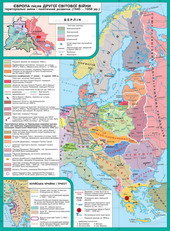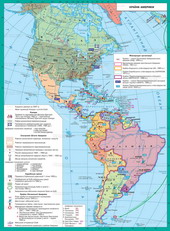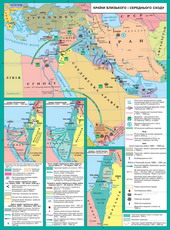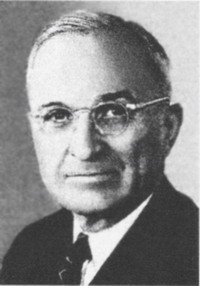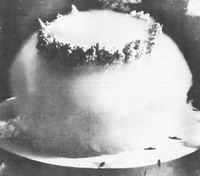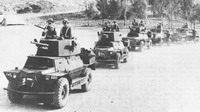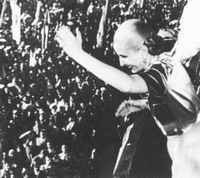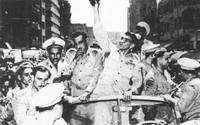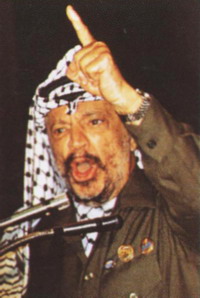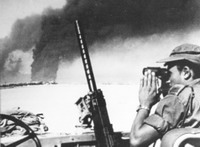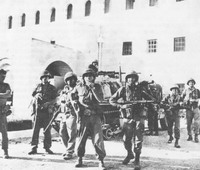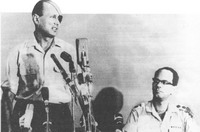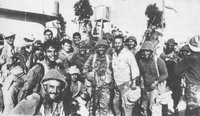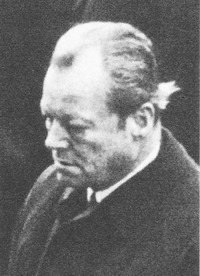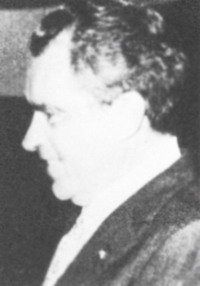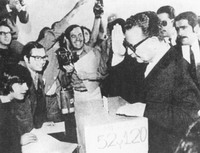§10. United States in 1940 50 years

1. Changeinternational status of the United States because of World War II
United States - the only country whichDuring the war strengthened. By the end of the war were under U.S.80% gold reserve of the capitalist world (21 tons). Their share wasapproximately 60% of world industrial production (excluding the USSR). Americanproducts accounted for 40% of goods in the West. Increased national income.Most of the world was in financial dependence on the United States. There was a highand U.S. moral authority - the state which has made a significant contribution to the defeatFascism and was initiated by the UN. The U.S. had a large military advantage(The world's largest ocean-going navy, strategic aircraft) over other countries andmonopoly possessed nuclear weapons (it gave an opportunity to shorten Army12 million to 1 million in 1947). U.S. became a superpower. This meant thatany change in any region of the world affect U.S. interests. Statussuperpower left its mark on domestic and foreign policy.
2. H. Truman Presidency
Postwar period in U.S. historyconnected with the presidency of H. Truman. In his policy had a significant imprinteffects of war and software installation Democratic Party.
Factorsimpact on the administration of President Truman G.
|
Negative
|
Positive
|
|
·
Decline in post-war production.
·
Beginning of the Cold War of which require substantial financial and material resources.
·
Korean War (1950-1953).
·
Narrowing of the external market.
|
·
Acquiring U.S. superpower status.
·
Substantial financial and material resources accumulated during the war.
·
Positive effects of "New Deal" F. Roosevelt.
·
Home STC.
|
In the early postwar years before the U.S.standing problem of transferring the economy to peaceful track (conversion) and preventioninevitable decline in production (economic crisis). The American administrationset for itself three main objectives: to prevent stagnation of the economy,provide high employment, to prevent inflation. For thissupposed to immediately reduce the armed forces, to ensure full employmentdemobilized, to reconversion while maintaining control over the enterprisesto prevent acute crises. To implement this program was made"GI Bill of Rights" (1944) and Actemployment "(1946). This policy was called"Fair exchange.
December 31, 1946 President H. Truman (1884-1972) announced"End of hostilities." It was liquidated by the emergencycontrol over production, which existed during the war, received a monopolyfreedom of action, but that does not mean the elimination of the state system of regulation,created during the 1929-1945 biennium Actively conducted in the Life "planMarshall (! 947-1951), which was to ensure the return of the market in Europeand eliminate oversaturation of capital in the U.S. (to be examined in detail on theselessons). There were reorganizing the state apparatus. In 1947,created the National Security Council, Central Intelligence Agency (CIA)reorganized the military authorities. Go to the U.S. Constitution amended in accordance withwhich the president can be elected no more than two consecutive terms. Foreign policyUnited States conducted a course for confrontation with the USSR.
However, these measures do not deliverAmerican economy from recession. Decreased earnings of most Americans,increased unemployment, increased prices. This situation led to the deploymentmass strike movement. In 1945 striking 3.5 million persons and in1946 - 4.6 million people. The growth strike movement causedthe administration reaction, which led to the adoption in June 1947antyprofspilkovoho Taft-Hartley Act, named after the names of SenatorRobert Taft and a member of the House of Fred Hartley.
The law limited the rights of workers toCollective Bargaining. From union leaders claimed subscriptionthey are not communists or members of other "subversive" organizations.Banned Solidarity strikes, strikes of civil servants.
From the Taft-Hartley Act (dated 23 July1947)
“…§ 8. From the employer unfairly:
1)
intervenemaintain or to force those who are hired to renounce participation in unionactivities;
2)
useinfluence or interfere with the formation or management of any labor organization;
3)
resort todiscrimination in hiring and continuing to hire or promoteresist participation in any labor organization?
From thelabor organization or its agents be dishonest:
1)
keepforce or from those that are recruited to join the labor organization;
2)
refuseof collective bargaining with the employer;
3)
participateor employed to induce and encourage any employer to participate in a strike?
4)
force orrequire any employer to confess that he or negotiated withlabor organizations as a representative of their work?
§ 35.Illegal for any person in the service of the U.S. or anyU.S. agencies, including conferences, wholly owned by the government to participatein any strike ... "
Recession, deteriorationfinancial position, Taft-Hartley Act. led to the collapse of authorityPresident Truman. It is to raise his popularity, at the regular electionproposed program, which ensured him victory.
In 1949, Truman sentCongress a broad program of reforms in the spirit of neoliberalism (Keynesianism). Itincluded the following provisions: the abolition of Taft-Hartley Act (on the eveElection 1948 Truman vetoed it), expansion of socialand the introduction of health insurance, making federallaws in the area of civil rights, financial assistance for statesimproving education, raising the minimum wage, constructioncheap housing, wide hidrobudivnytstvo, guarantees stable income for farmersby cheap loans, inviolability of constitutional freedoms.
To implement the program fullyfailed because of economic (1948-1949 crisis years) and foreignreasons (a nuclear bomb in the USSR and the victory of the revolution in China). Alsocontradicted Congress approved a presidential veto Taft-Hartley Act. Not adopted lawsabout civil rights for American blacks, the introduction of medicalinsurance, state aid educational institutions and others.
Under the influence of these factorseconomic situation continued to worsen: increased taxes, statedeficit, and in January 1951 began rapid inflation. Administrationhad to go for establishing tight control over prices. This is notrectified the situation and ultimately led to the collapse of authority Democrats.
3. McCarthyism (1950-1954)
The deployment of the ColdWar effect on the internal political life of Western countries. limiteddemocratic rights, persecution undergone left-wing forces (Communists, anti-war forces andmovements, citizens who sympathized with the USSR). In the U.S., this trend is manifested inmakkartyzmu policy. McCarthyism emerged as a reaction to revolution in China and the lossChinese market, which was reinforced by the war in Korea.
Speaking February 9, 1950,eccentric Senator J. McCarthy said: "Six years ago ininfluence of the USSR was 180 million people ... Now for 800 million people were underabsolute power in Soviet Russia - an increase of 400%. Reasons thatwe were powerless, not because our only powerful opponent senttroops for the invasion on our shores, and the betrayal of those to whom our nationrelates so well ... I think the State Department yielded to the communistinfiltration. "In his speech, he even called the number of communists inState Department - 205 (the truth is in the printed version of his speech containedfigure 57).
The speech was the signal foranti-communist forces. Despite the presidential veto in September1950 adopted the law on internal security. " Beganharassment and arrests of leaders of the Communist Party USA (arrested 140 persons) andTrade Unions (arrested 100 people), the persecution of liberalprofessors, the "witch hunt" spy (held a number ofarrests (Klaus Fuchs, Harry Gold, Hrinhlas, marriage Rosenberg, who wereexecuted by electrocution), and lawsuits over "Sovietspies ("Oppenheimer Case"). 255 organizations in the United States were considered "subversive."
About Binge makkartyzmu showsOne interesting fact. In the city of Madison (Wisconsin) 112 local reportersnewspapers have offered to sign up to an extract of the Bill of Rights (10 amendmentsU.S. Constitution) without informing what the document. 111 reporters refusedfrom this, believing that they pidsovuyut Communist propaganda.
Interestingknow
During this period he worked in the U.S.Soviet spy number 1 William H. Fisher (Rudolf Abel). During the secondWorld War acted as an agent in the German rear. He served in the Wehrmacht, controlledGerman Radystiv work even awarded "Iron Cross". Hisactive in the United States lasted from 1948 to 1957. He couldorganize agent networks, which had access to "atomic secrets" and the U.S.other military information. In 1957 was arrested (issued by otherSoviet agent MK Ivanov (Raynaud Heyhanenom)). During the trialhe was awarded the 1930 imprisonment. During the trial, he saidonly 7 words. In 1960 was exchanged for American spy pilotFrancis Powers. That was shot down over Soviet territory.
McCarthyism was not a long termtrend of domestic U.S. policy. This was due to: 1. The U.S. was notmass base for the communist movement. 2. Advances in opposing the Soviet Union toforeign policy arena. 3. Warming international position in the middle1950's
4. D. Eisenhower Presidency.
Failures of reforms ofDemocrats promoted the growth of authority of the Republican Party. PopularNational hero D. Eisenhower (chief of the Allied troops inEurope during the Second World War) became the official Republican candidateas president. Election 1952 turned into a personal triumphD. Eisenhower (1890-1969).
Socio-economic development in the U.S.during the reign of the Republicans can be described as follows: slowgrowth rates of production and frequent crises (1953-1954, 1957-1958,1960-1961 biennium), early introduction of automation in various fieldsproduction process (the introduction of automatic machinery, conveyor methodprocessing, automatic control systems, electronic systems)noticeable change in the structure of labor (increasing number of workersnon-production sectors, reduction of farmers in society relative to other populationsfrom 16,6% to 12%), intensive development of military-industrial complex. All thatamid stagnant social and economic processes.
In 50 years undergoing changesRepublican and Democratic parties: social-economic developmentconsidered them in the development of state regulation of economy.
These two factors had a significant impact onhis domestic political course. On the one hand, he expanded socialprogram initiated by the Democrats, on the other - he did not allow them to cut,as this required a majority of Republicans. Another form of his conceptpresidency, Eisenhower said that the country needs rest after bigupheavals of the Second World War.
In the period of administrationEisenhower falls warming of relations between the USSR and the U.S., ending the war inKorea. In 50 years could prevent acute international crises. The main purposeU.S. was addressing the threat of Soviet penetration of new regions of the world. For this purpose,was developed "Eisenhower doctrine" under which the U.S. shouldfill the "vacuum" which is the dissolution of colonialBritish and French empires and the formation of independent states, andcounter the Soviet Union not everywhere, but where favorable conditions skladutsya Strategymassive retaliation. " The essence of this strategy, Eisenhower expressed himself: "The U.S. does notCall tie ourselves to counter communism in any place ofworld. On the validity of the USSR in one place the U.S. can respond in another, where theyconsidered appropriate. Using a while, if need be, nuclear weapons.Only force can help, the weakness may not help, it can onlypanhandle.
Results
After World War II U.S.were leading the Western world superpower in the confrontation with the Soviet Union (communism). OnH. Truman presidency and D. Eisenhower scored its first phase of the Cold War.During the Truman and Eisenhower's presidency there was rapid progressdevelopment of the country, although he was accompanied by periodic economic crises,which were caused by postwar downturn and restructuringU.S. economy in terms of deployment of NTR. During this period took placestrengthening of the American political system, "the American lifestyle."Continued process of further democratization of American society. Butin this way failed to avoid attempts by some political forces to limitdemocratic rights. McCarthyism was not a long term trend.
Questions and tasks:
1. Identify the consequences of the Second World War for the U.S.. Give the definition of"Superpower".
2. What are the basic steps the administration of President Truman, who hadensure the elimination of crises in the post-war economy and to ensurefurther development of the United States.
3. What "law" Taft-Hartley? What raised the ire of workerslaw? Why it has not been lifted?
4. Why Truman failed to fully implement the declared plans?
5. What is McCarthyism? Was McCarthyism natural phenomenon? Why he did notlong-term trend?
6.
Fill in the table: H. Truman Presidency and D. Eisenhower
|
Presidency H. Truman
|
Presidency D. Eisenhower
|
Domestic Policy
|
|
|
Foreign Policy
|
|
|
 English
English

